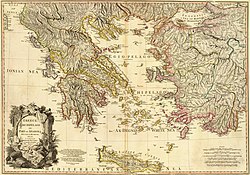
Back حرب الاستقلال اليونانية Arabic حرب الموره ARZ Guerra d'independencia de Grecia AST Yunanıstan İstiqlaliyyət müharibəsi Azerbaijani یونان باغیمسیزلیق ساواشی AZB Вайна за незалежнасць Грэцыі Byelorussian Гръцка война за независимост Bulgarian গ্রিক স্বাধীনতা যুদ্ধ Bengali/Bangla Guerra d'independència de Grècia Catalan Řecká osvobozenecká válka Czech
| History of Greece |
|---|
 |
|
|
| Rise of nationalism in the Balkans Nationalism under the Ottoman Empire |
|---|
| Part of a series on |
| Political revolution |
|---|
 |
|
|
The Greek War of Independence,[b] also known as the Greek Revolution or the Greek Revolution of 1821, was a successful war of independence by Greek revolutionaries against the Ottoman Empire between 1821 and 1829.[3] In 1826, the Greeks were assisted by the British Empire, Kingdom of France, and the Russian Empire, while the Ottomans were aided by their vassals, especially by the Eyalet of Egypt. The war led to the formation of modern Greece, which would be expanded to its modern size in later years. The revolution is celebrated by Greeks around the world as independence day on 25 March.
All Greek territory, except the Ionian Islands, the Mani Peninsula, and mountainous regions in Epirus, came under Ottoman rule in the 15th century.[4] During the following centuries, there were Greek uprisings against Ottoman rule. Most uprisings began in the independent Greek realm of the Mani Peninsula, which was never conquered by the Ottomans.[5] In 1814, a secret organization called the Filiki Eteria (Society of Friends) was founded with the aim of liberating Greece. It planned to launch revolts in the Peloponnese, the Danubian Principalities, and Constantinople. The insurrection was planned for 25 March 1821, the Orthodox Christian Feast of the Annunciation. However, the plans were discovered by the Ottoman authorities, forcing it to start earlier.
The first revolt began on 21 February 1821 in the Danubian Principalities, but it was soon put down by the Ottomans. These events urged Greeks in the Peloponnese into action and on 17 March 1821, the Maniots were first to declare war. In September 1821, the Greeks, under the leadership of Theodoros Kolokotronis, captured Tripolitsa. Revolts in Crete, Macedonia, and Central Greece broke out, but were suppressed. Greek fleets achieved success against the Ottoman navy in the Aegean Sea and prevented Ottoman reinforcements from arriving by sea. Tensions developed among Greek factions, leading to two consecutive civil wars. The Ottoman Sultan called in Muhammad Ali of Egypt, who agreed to send his son, Ibrahim Pasha, to Greece with an army to suppress the revolt in return for territorial gains. Ibrahim landed in the Peloponnese in February 1825 and brought most of the peninsula under Egyptian control by the end of that year. Despite a failed invasion of Mani, Athens also fell and revolutionary morale decreased.
The three great powers—Russia, Britain, and France—decided to intervene, sending their naval squadrons to Greece in 1827. They destroyed the Ottoman–Egyptian fleet at the Battle of Navarino, and turned the tide in favor of the revolutionaries. In 1828, the Egyptian army withdrew under pressure from a French expeditionary force. The Ottoman garrisons in the Peloponnese surrendered and the Greek revolutionaries retook central Greece. The Ottoman Empire declared war on Russia allowing for the Russian army to move into the Balkans. This forced the Ottomans to accept Greek autonomy in the Treaty of Adrianople and semi-autonomy for Serbia and the Romanian principalities.[6] After nine years of war, Greece was recognized as an independent state under the London Protocol of February 1830. Further negotiations in 1832 led to the London Conference and the Treaty of Constantinople, which defined the final borders of the new state and established Prince Otto of Bavaria as the first king of Greece.
- ^ Sakalis, Alex (25 March 2021). "The Italians Who Fought for Greek Independence". Italics Magazine. Retrieved 15 September 2022.
- ^ Note: Greece officially adopted the Gregorian calendar on 16 February 1923 (which became 1 March). All dates prior to that, unless specifically denoted, are Old Style.
- ^ "War of Greek Independence | History, Facts, & Combatants". 2 April 2024. See also: Cartledge, Yianni; Varnava, Andrekos, eds. (2022). Yianni Cartledge & Andrekos Varnava (eds.), New Perspectives on the Greek War of Independence: Myths, Realities, Legacies and Reflections, Palgrave Macmillan/Springer. doi:10.1007/978-3-031-10849-5. ISBN 978-3031108488. S2CID 253805406.
- ^ Finkel, Caroline (2007). Osman's Dream: The History of the Ottoman Empire. Basic Books. p. 17. ISBN 978-0465008506.
- ^ Woodhouse, A Story of Modern Greece, 'The Dark Age of Greece (1453–1800)', p. 113, Faber and Faber (1968)
- ^ Bushkovitch, Paul (2012). A concise history of Russia. New York: Cambridge University Press. p. 169. ISBN 978-0521543231.
Cite error: There are <ref group=lower-alpha> tags or {{efn}} templates on this page, but the references will not show without a {{reflist|group=lower-alpha}} template or {{notelist}} template (see the help page).
